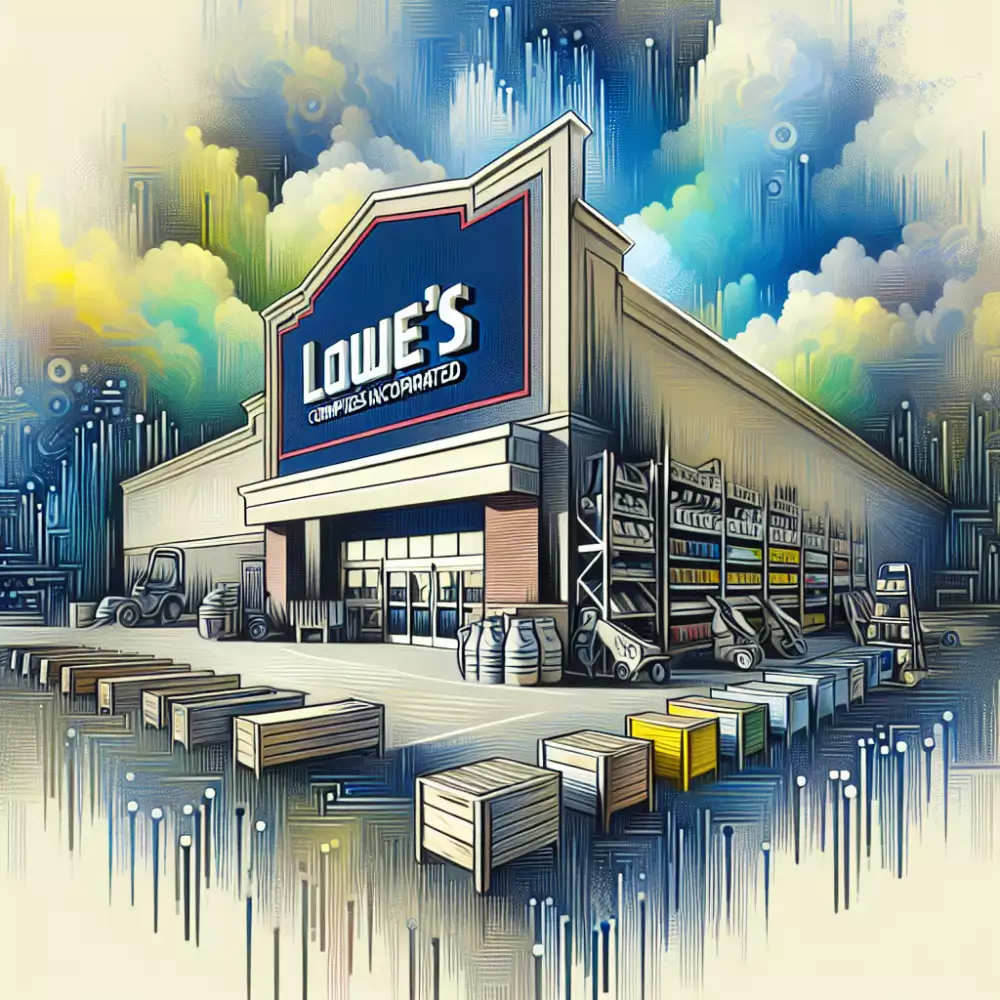Lowe's Companies Inc. Navigates a Changing Market

Corporate Overview
Lowe's Companies, Inc. is a Fortune 50 company headquartered in Mooresville, North Carolina. As a leading home improvement retailer, Lowe's operates a network of over 1,970 stores in the United States and Canada. The company serves approximately 17 million customers a week. Lowe's offers a wide range of products for home improvement, maintenance, repair, and décor. This includes appliances, building materials, tools, paint, flooring, and outdoor power equipment. Lowe's also provides installation services for many of its products. The company has a long history dating back to 1946. It has grown significantly over the years through organic expansion and strategic acquisitions. Lowe's is publicly traded on the New York Stock Exchange under the ticker symbol LOW. It is a significant employer with a large workforce dedicated to serving customers and helping them improve their homes. Lowe's is committed to corporate social responsibility and supports various community initiatives through the Lowe's Charitable and Educational Foundation.
Products and Services
Lowe's Companies, Inc. is a leading home improvement retailer catering to both DIY homeowners and professionals. Lowe's operates a vast network of retail stores, primarily under the Lowe's banner, offering a wide array of products and services for home improvement and maintenance needs.
The product selection at Lowe's encompasses appliances, building materials, cabinets, countertops, decking, electrical supplies, flooring, hardware, HVAC equipment, kitchen and bath fixtures, landscaping materials, lighting, outdoor power equipment, paint, plumbing supplies, tools, and more. Lowe's provides installation services for many of its products, including appliances, cabinets, countertops, flooring, and windows. These services simplify home improvement projects for customers by connecting them with qualified professionals.
Lowe's offers various financing options, including credit cards and project loans, to help customers manage the cost of their home improvement purchases. Lowe's provides online resources, such as DIY guides, project calculators, and product reviews, to assist customers with their home improvement endeavors. Lowe's operates a customer loyalty program, MyLowe's, which offers benefits such as exclusive discounts, personalized offers, and purchase tracking.
Target Market
Lowe's Companies, Inc. doesn't have a parent company. It operates as an independent, publicly traded company listed on the New York Stock Exchange under the ticker symbol LOW. As a leading home improvement retailer, Lowe's targets a broad customer base encompassing both DIY homeowners and professional contractors.
The DIY segment includes individuals who enjoy tackling home improvement projects themselves, ranging from simple repairs to more complex renovations. These customers are often motivated by cost savings, a sense of accomplishment, and the desire to personalize their living spaces. Lowe's caters to this segment by offering a wide selection of products, tools, and materials, along with helpful resources like how-to guides, workshops, and online tutorials.

On the professional side, Lowe's targets contractors, builders, and other trade professionals who rely on the company for their material needs. This includes everything from lumber and building materials to appliances and fixtures. Lowe's provides these customers with specialized services such as bulk pricing, dedicated account managers, and convenient delivery options to support their business operations.
Revenue Model
Lowe's Companies, Inc. operates as a home improvement retailer, primarily serving homeowners, renters, and professional contractors. The company generates revenue through the sale of a wide range of products, including appliances, building materials, casual living products, cleaning supplies, décor products, electrical equipment, flooring, hardware, home organization products, kitchen and bath products, lawn and garden supplies, lumber, millwork, outdoor living products, paint, plumbing products, storage products, tools and accessories, and other related merchandise.
| Feature | Lowe's | Home Depot |
|---|---|---|
| Revenue (USD Billion) | 97.06 | 157.40 |
| Number of Stores | 1,971 | 2,317 |
Lowe's also provides various services, such as appliance installation, contractor referrals, delivery, design services, equipment rentals, gift cards, home improvement consultations, key cutting, and small engine repair. The company operates through a network of physical stores and online platforms. As of the date of this response, Lowe's Companies, Inc. is a publicly traded company and is not owned by any other corporation.
Key Competitors
Lowe's Companies, Inc. doesn't have a parent company. It operates as an independent, publicly traded company. However, like any major player in a competitive market, Lowe's faces stiff competition from other giants in the home improvement retail sector. The most prominent name on that list is undoubtedly Home Depot. As the largest home improvement retailer in the US, Home Depot consistently challenges Lowe's for market share with its vast inventory, competitive pricing, and strong brand recognition.
Another significant competitor is Menards, a privately owned chain particularly strong in the Midwest. Menards differentiates itself with its unique product offerings, including building materials, and its focus on everyday low prices. While not a direct competitor in the same way as big-box stores, Amazon also presents a considerable challenge. The e-commerce behemoth has been aggressively expanding its home improvement and DIY product selection, leveraging its massive online presence and convenient delivery options to attract customers.

Beyond these major players, Lowe's also contends with a range of specialized retailers, local hardware stores, and online marketplaces. These competitors carve out their niches by offering unique products, personalized service, or competitive pricing within specific geographic areas or product categories.
Supply Chain
Lowe's Companies, Inc. doesn't have a parent company. It operates as an independent, publicly traded company listed on the New York Stock Exchange under the ticker symbol LOW. Lowe's maintains a vast and intricate supply chain to ensure that products are available to customers across its extensive network of stores and online platforms. The company sources products from a global network of suppliers and vendors, managing the flow of goods from manufacturing facilities to distribution centers and ultimately to stores or directly to customers' homes. Lowe's supply chain strategy focuses on efficiency, optimization, and responsiveness to customer demand. The company leverages technology, data analytics, and strategic partnerships to streamline its supply chain operations. This includes using sophisticated inventory management systems, transportation optimization software, and predictive modeling to forecast demand and ensure timely product availability. Lowe's has implemented various initiatives to enhance its supply chain sustainability. These efforts include partnering with suppliers committed to ethical sourcing and environmental responsibility, reducing waste throughout its operations, and optimizing transportation routes to minimize its carbon footprint. Lowe's supply chain plays a critical role in its overall success by enabling the company to provide customers with a wide selection of products at competitive prices while maintaining high levels of customer satisfaction. The company's ongoing investments in supply chain technology and sustainability initiatives are crucial for navigating the evolving retail landscape and meeting the changing expectations of customers.
Marketing Strategy
Lowe's, a leading home improvement retailer, operates under its own corporate umbrella, Lowe's Companies, Inc. Their marketing strategy centers around a multi-faceted approach aimed at capturing both DIY homeowners and professional contractors.
Lowe's heavily invests in television and digital advertising, often featuring relatable scenarios that resonate with homeowners tackling projects. They leverage social media platforms to engage with customers, offer inspiration, and provide quick solutions through how-to videos and articles. Recognizing the importance of mobile, Lowe's app provides a seamless shopping experience, allowing users to browse products, check inventory, and access their loyalty program.

Speaking of loyalty, Lowe's leverages its "MyLowe's" program to reward repeat customers with exclusive discounts, personalized offers, and purchase tracking. They understand the value of professionals and offer dedicated programs like Lowe's For Pros, providing bulk discounts, specialized credit options, and contractor-specific products. Lowe's also understands the power of community engagement. They frequently partner with local charities and organizations, sponsoring events and workshops that solidify their presence in neighborhoods.
E-commerce Presence
Lowe's Companies, Inc. doesn't have a parent company. It operates as an independent, publicly traded company listed on the New York Stock Exchange under the ticker symbol LOW. Lowe's has cultivated a robust e-commerce presence, becoming a cornerstone of its omnichannel retail strategy. Recognizing the evolving landscape of consumer behavior, Lowe's has invested heavily in its digital platform to provide a seamless shopping experience that complements its physical stores.
The company's website and mobile app offer a vast inventory of home improvement products, appliances, tools, and building materials, mirroring the breadth of its in-store offerings. Customers can browse products, compare prices, read reviews, and make purchases with ease. Lowe's leverages its e-commerce platform to enhance customer convenience through services like online ordering with in-store or curbside pickup and home delivery options.
This flexibility caters to the varying preferences of its customer base, allowing them to choose the fulfillment method that best suits their needs. Furthermore, Lowe's utilizes its online presence to deliver informative content, including DIY project guides, product demonstrations, and expert advice. This content strategy aims to empower customers with the knowledge and inspiration to tackle their home improvement endeavors.
The e-commerce platform also serves as a valuable channel for Lowe's to engage with its customers through personalized promotions, targeted advertising, and loyalty programs. By leveraging data analytics, Lowe's can tailor its online offerings to individual customer preferences and purchase history, fostering stronger customer relationships and driving sales.
Sustainability Initiatives
Lowe's Companies, Inc., a leading home improvement retailer, recognizes the importance of environmental and social responsibility. The company has implemented various sustainability initiatives across its operations, demonstrating its commitment to a healthier planet and stronger communities. Lowe's focuses on reducing its environmental footprint by minimizing waste, conserving energy, and promoting sustainable sourcing practices. The company has set ambitious goals to reduce greenhouse gas emissions and achieve net-zero emissions by 2050. Lowe's actively works to reduce waste generation through recycling programs and responsible material sourcing. Lowe's is committed to offering a wide selection of sustainable products that meet the needs of environmentally conscious customers. These products include energy-efficient appliances, water-saving fixtures, and responsibly sourced lumber. By providing these options, Lowe's empowers customers to make sustainable choices for their homes and contribute to a greener future. Lowe's understands the importance of community engagement and partners with organizations to support initiatives that align with its sustainability goals. The company actively supports organizations involved in disaster relief, community development, and environmental conservation. Through these partnerships, Lowe's aims to make a positive impact on the communities it serves. Lowe's Companies, Inc. is dedicated to operating responsibly and sustainably. Through its comprehensive sustainability initiatives, the company strives to minimize its environmental impact, promote social responsibility, and create a better future for all.

Labor Relations
Lowe's Companies, Inc., a Fortune 500 home improvement retail giant, does not have a parent company. It operates independently and is publicly traded on the New York Stock Exchange under the ticker symbol LOW. As a large employer with a vast workforce across numerous locations, labor relations are a significant aspect of Lowe's operations.
While Lowe's is not unionized in the traditional sense, its labor relations are subject to various federal and state labor laws, including those related to wages, hours, working conditions, and non-discrimination. Lowe's has established its own human resources policies and procedures to manage its relationship with employees. These policies cover areas such as compensation, benefits, employee relations, and dispute resolution.
Lowe's emphasizes a commitment to providing competitive wages and benefits packages to attract and retain talent. The company also focuses on creating a positive work environment and providing opportunities for employee growth and development. Like many large corporations, Lowe's has faced lawsuits and allegations related to employment practices in the past. These have covered areas such as wage and hour disputes, discrimination claims, and wrongful termination allegations.
Lowe's generally aims to resolve employee concerns and disputes through internal mechanisms, such as its human resources department and established grievance procedures. The company's approach to labor relations is influenced by factors such as its industry, competitive landscape, and the overall economic climate.

Financial Performance
Lowe's Companies, Inc. is a publicly traded company listed on the New York Stock Exchange under the ticker symbol LOW. As an independent, publicly traded company, Lowe's is not owned by another corporation. The company operates under its own management and board of directors, responsible for making strategic decisions and ensuring its financial health. Investors and analysts closely scrutinize Lowe's financial performance, using metrics like revenue growth, profitability, and return on investment to gauge its success. Financial reports, including quarterly earnings releases and annual reports, provide transparency into Lowe's financial standing, allowing stakeholders to assess its stability and growth potential. Lowe's, as a major player in the home improvement retail sector, consistently strives to deliver value to its shareholders through a combination of operational efficiency, strategic initiatives, and a focus on meeting evolving customer needs.
Future Outlook
Lowe's Companies, Inc. is publicly traded and not owned by another corporation. Therefore, discussing the future outlook of a non-existent parent company is not possible.
However, we can discuss the future outlook for Lowe's itself. Lowe's has positioned itself as a leader in the home improvement retail market. The company's focus on enhancing its online presence, expanding its product and service offerings, and improving customer experience is expected to drive future growth. Lowe's is also investing in its professional contractor business, a key growth area in the home improvement market. Economic conditions like inflation and interest rates can impact consumer spending on home improvement projects. Lowe's will need to navigate these challenges effectively to maintain its positive trajectory. The company's strong brand recognition, vast network of stores, and commitment to innovation bode well for its future prospects.
Publikováno: 20. 08. 2024
Kategorie: Business



